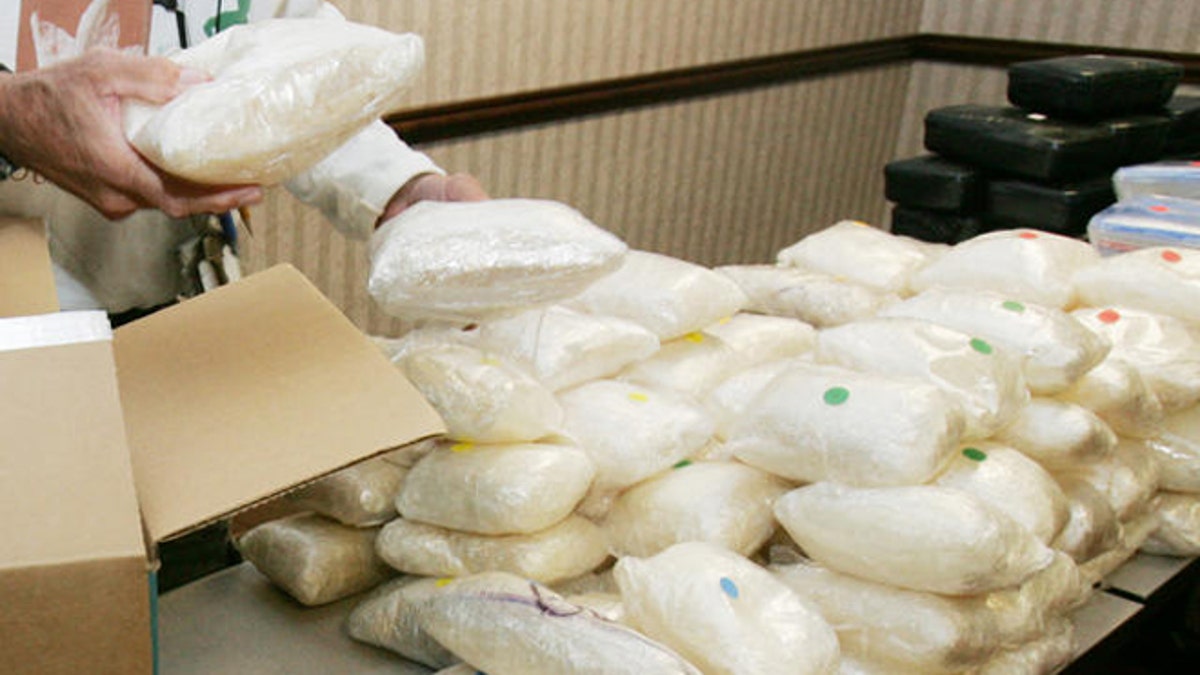
A U.S. Drug Enforcement Administration agent shows some of the 187 plus pounds of methamphetamine. (AP)
WASHINGTON – As states struggle to clamp down on a growing meth epidemic, they're turning to a tactic commonly used to target sex offenders: name and shame.
The latest state to go this route, Indiana, passed a law last month which would require the government to list the locations of busted meth labs on an online registry. It's a bid to shame not only the drug makers but also property owners and landlords.
The new law, which goes into effect July 1, will give owners six months to clean up their methamphetamine mess. If they fail to do so, their properties will be placed on the online list.
“It’s one central site that everyone can get access to,” state Sen. Randy Head, a Republican, told FoxNews.com. “What we are trying to do is provide an incentive for owners to get their homes cleaned up.”
Head, who helped pass the Indiana legislation, says not only will it expose meth makers in a neighborhood but it also lets potential homeowners and renters know if the property they are considering was once a drug den.
“It’s dangerous to live (where meth was manufactured),” Head said. “The poison from meth labs stays in the drywall. You can’t just go wash it out. This forces the property to be cleaned.”
Contaminated homes pose health hazards, particularly to children, according to the Indiana Department of Environmental Management. For every pound of meth produced, up to seven pounds of chemical waste is left behind. Molecules from the drug can cling to walls, floors and carpets.
Indiana is the country’s new meth lab capital in terms of seizures. In 2013, the state led the nation with more than 1,700 busts. Indiana bumped last year’s leader, Missouri, to third in the nation. Tennessee ranked second, with Ohio and Illinois taking the fourth and fifth spots.
Indiana, though, is just the latest state outing meth houses through online databases. Idaho, Alaska, Michigan, Montana, Oregon, Tennessee and Washington all list addresses of homes, apartments, motel rooms and, in some cases, cars that have been used to cook meth.
Head says not only will the new law expose people who aren’t decontaminating makeshift labs, but it also calls out neighborhoods and areas that house meth labs.
Once on the list, properties will only be eligible for removal 90 days after they are cleaned and declared habitable. The new law also transfers control of the reporting website to the state police from the Indiana Criminal Justice Institute.
The CJI technically had the authority to create an online registry but has never received funding from the state. The Indiana State Police, which already has a database of meth lab seizures, is now in the process of transferring the material online.
Indiana State Police First Sgt. Niki Crawford, commander of the methamphetamine suppression section of the Indiana State Police, calls the new law “a public safety tool.”
According to the National Alliance for Model State Drug Laws, it’s illegal in 12 states for people to live in a former meth house before decontamination. Fourteen states require owners to disclose whether the property was used for drug production.
In 2006, the Drug Enforcement Administration announced it would post locations in each state that contained meth labs or dumpsites so people would know if there were drug houses in their neighborhood. However, the list was plagued with inconsistencies and lacked updates. Instead, states started opting to come up with their own solutions to combat the growing problem.












































